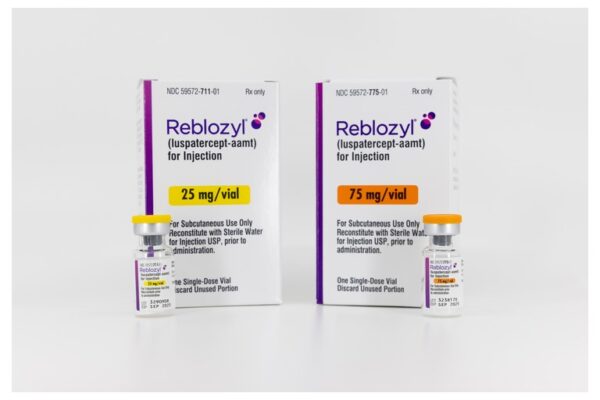
A Bristol Myers drug that treats anemia caused by a type of blood cancer now has an FDA approval that moves it up in the hierarchy of treatments, expanding the eligible patient population and positioning the therapy to achieve its blockbuster expectations.
The drug, Reblozyl, treats myelodysplastic syndromes (MDS), a group of cancers in which the immature blood cells in bone marrow do not mature to become healthy blood cells. In 2020, the FDA approved Reblozyl as a second-line treatment for the anemia resulting from MDS. The FDA decision announced late Monday makes it a first-line therapy.

With the Rise of AI, What IP Disputes in Healthcare Are Likely to Emerge?
Munck Wilson Mandala Partner Greg Howison shared his perspective on some of the legal ramifications around AI, IP, connected devices and the data they generate, in response to emailed questions.
MDS can be treated with erythropoiesis stimulating agents, which are drugs that stimulate red blood cell production. Patients who have MDS also require frequent blood transfusions to increase red blood cell levels. But frequent transfusions bring the risk of iron overload as well as transfusion reactions and infections. Drugs can be used to remove the excess iron, but they also bring the risk of additional complications.
Reblozyl is a fusion protein engineered to suppress a signaling pathway whose excessive activity impedes proper red blood cell production. The drug is administered in a subcutaneous injection given every three weeks. The latest approval for Reblozyl covers adults with very low- to intermediate-risk MDS that has not previously been treated with an erythropoiesis stimulating agent, such as Amgen’s Epogen. These patients may also require regular blood transfusions.
The new FDA nod is based on interim results from the Phase 3 study, called COMMANDS, which compared Reblozyl head-to-head against Epogen. Results showed 58.5% of those treated with the study drug achieved the main goal of transfusion independence of at least 12 weeks. By comparison, 31.2% of participants in the Epogen group achieved this mark. The most common adverse reactions were diarrhea, fatigue, hypertension, peripheral edema, nausea, and difficulty breathing. In June, these results were presented at the annual meeting of the American Society of Clinical Oncology and published in the journal The Lancet.
“For patients with lower-risk MDS, current standard therapies, including [erythropoiesis stimulating agents], have provided limited benefit in controlling anemia with only 1 in 3 patients responding for a duration of 6-18 months,” Guillermo Garcia-Manero, lead investigator of the study and chief of the section of myelodysplastic syndromes at The University of Texas MD Anderson Cancer Center, said in a prepared statement. “Results from the COMMANDS study showed nearly twice as many patients treated with Reblozyl achieved transfusion independence of at least 12 weeks and concurrent hemoglobin increase compared to epoetin alfa.”
Approval of Reblozyl as a first-line MDS therapy covers treatment of patients regardless of whether their disease comes with ringed sideroblasts, which are immature red blood cells with nuclei surrounded by rings of iron. The initial MDS approval covered patients with ringed sideroblasts. In a note sent to investors, William Blair analyst Matt Phipps wrote that the approval regardless of ringed sideroblast status is a positive for BMS, expanding the potential market for the drug as more than two thirds of newly diagnosed MDS patients are expected to be ringed sideroblast negative. The latest approval marks the third approved indication for Reblozyl. It first passed regulatory muster in 2019 as a treatment for anemia caused by the rare blood disorder beta thalassemia.
BMS reported $717 million in 2022 sales for Reblozyl, a 30% increase over sales in the prior year. With the latest approval, the drug’s addressable patient population in MDS more than doubles, Phipps said. William Blair projects Reblozyl will top $1 billion in sales this year, achieving peak sales of more than $4 billion.
Reblozyl’s history spans several companies. Reblozyl came from the labs of Acceleron Pharma, which partnered with Celgene on the drug’s development. In 2019, BMS acquired Celgene in a $74 billion deal. Two years ago, Merck acquired Acceleron for $11.5 billion. BMS and Merck share in the global development and commercialization of Reblozyl.
Photo by Bristol Myers Squibb














